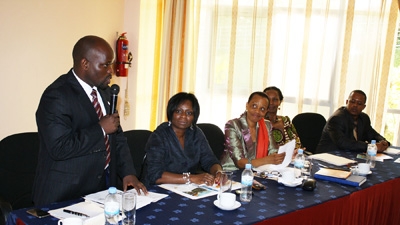KIGALI, April 2, 2012 -- The Ministry of Gender and Family Promotion (MIGEPROF) recently launched the Economic Empowerment of Adolescent Girls and Young Women project to help adolescent girls and young women establish businesses or resume their formal education.
The launch brought to close activities held throughout March as part of Women and Girls Month to celebrate the progress girls and women have made in Rwanda under the theme “Empower Women and Girls to Sustain Families.”
Hon. Alvera Mukabaramba, Minister of State in charge of Social Affairs, opened the launch and reiterated the Rwandan government’s commitment to addressing social-structural issues, including inequalities linked to gender and poverty.
The Adolescent Girls Initiative (AGI), which finances the new initiative, promotes the transition of adolescent girls from school to productive employment. The project objectives are to improve employment, income and empowerment of disadvantaged adolescent girls and young women in four districts in Rwanda. To this end, the project has three components: vocational skills and support for entrepreneurship, scholarships to resume formal education and capacity building for MIGEPROF.
The US$2.7 million grant will allow 2,700 women and girls to receive vocational skills training, which is being implemented by the Workforce Development Authority. The grant also supports 120 girls through scholarships implemented by the Imbuto Foundation.
Omowunmi Ladipo, the World Bank county manager, highlighted a number of reasons why the Bank and other development partners are focusing on youth and adolescent girls.
Despite Rwanda’s remarkable economic progress in the last few years, poverty remains widespread; 44.9 percent of the households still live below the poverty line, she said, and a significant proportion of these households -- 33 percent -- are headed by females and in some cases by young girls.
Ladipo also mentioned that youth play a critical role in efforts to tackle poverty over the long run; 54 percent of the Rwanda’s population is under the age 19.
Gender inequality continues to have important consequences, Ladipo said. Some 18 percent of women are still not paid for their labor, and only 23 percent of them work in non-farm employment. Additionally, social and institutional barriers impair girls’ performance in school. Today, still only 11.9 percent of girls have any secondary school education versus 14.5 percent of boys. Significantly fewer still, only 2.8 percent, complete secondary school at all.
Soon, technical training, entrepreneurial and life skills will start, and participants will be given a daily subsistence stipend, and mentoring to establish and run a business, and scholarships have already been awarded.
Twenty one year old Betty Mutuyimana, 21, is a beneficiary of a scholarship, and was an exemplary participant in the project.
“I have been out of school five years and live with my younger sister,” Mutuyimana said. “The scholarship has allowed me to complete Form 3 national exams where I passed in Division One. I am now preparing to take my Form 4 exams in Biology, Mathematics and Chemistry at College St Andre. I hope to pursue further studies and attend medical school.”
The Imbuto Foundation provides a package of services which include fees, daily stipend, child care, psychosocial counseling and mentors. Continuous monitoring and an impact evaluation at the end of the project will assist the government and partners to answer questions, such as the skills needed to support female entrepreneurs and which financial products can banks and private entities offer young women
At the end of the event, Hon. Jean Philbert Nsengimana, Minister of Youth and ICT, pointed out that the project will help the government learn more about how to remove the barriers that girls and young women face, and that stop them from realizing their full potential. He commended the girls for their achievements and noted that what is most important for the project to succeed is “the resolve and determination of each stakeholder to make it happen.”
Facts on the AGI
- A multi-donor trust fund administered by the World Bank
- Donors include the governments of Sweden, Denmark, Norway, Australia, United Kingdom and the Nike Foundation
- Eight Pilot Countries: Haiti, Jordan, Liberia, Afghanistan, South Sudan, Rwanda, Nepal, Lao PDR.
- Services Offered: Business development skills and training; Vocational training; and Scholarships to complete formal education
- Strong impact and evaluation to learn and scale up
- To date, $20 million has been disbursed among the pilot countries

